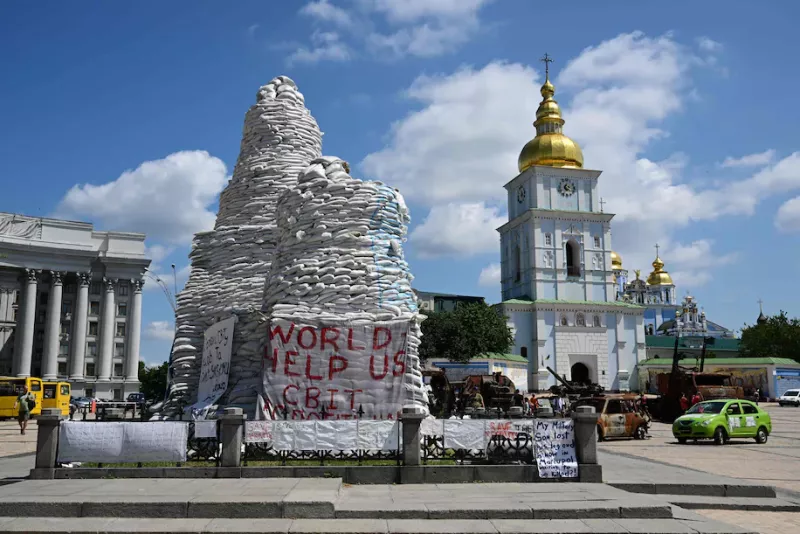
On June 25, Russian forces launched missile strikes at Kyiv, hitting an apartment complex and playground and killing at least one, while injuring several others. Two days later, a Russian airstrike on a shopping mall in the central Ukrainian city of Kremenchuk left at least 20 people dead.
For Ukrainians, it was yet another harrowing week that will leave lasting scars. After four months of this war, I can now tell the difference between explosions from the air defense shooting down a missile and a missile reaching its target. I shudder at loud noises, and I know that is just one way the war will live in people’s hearts and minds long after it is over.
Indeed, emotional trauma has become a part of life for millions of Ukrainians after the brutal Russian invasion of our country. Signs of post-traumatic stress disorder — including strong emotional reactions, reliving painful memories, insomnia, detachment and anxiety — have become commonplace and are palpable all around.
Alina Drobashko, a fitness trainer, is originally from the Donbas region. She delivered her second child in Kyiv in early March, when Russians were trying to capture the city. The doctors refused to give her epidural anesthesia so she could go down into the bomb shelter in case the sirens began ringing. She begged for, and ultimately received, anesthesia and prayed that there would not be a missile attack.
“When the siren sounds, I get very anxious inside”, Drobashko shares. “I don’t like planes, I don’t like when military planes or helicopters fly over. My body reacts, it shrinks, as if a fist beats inside my chest”.
Some Ukrainians hear the terrifying noise even when it is not there, are overwhelmed by recurring memories or feel fear at any loud sound. This is also true for Ukrainian children, describes Maria Hrabovska, a lawyer from the Kyiv region, who took her 7- and 11-year-old children abroad during the hottest period of the war.
She explains that, while in Europe, she could tell which children she encountered were Ukrainian. “As soon as a plane flew over, they either shrank or fell on the ground", says Hrabovska, who recently returned home.
Psychologist Kateryna Artyushenko says that PTSD often begins to show itself four to six months after a traumatizing event. She took a course organized by a charity fund, Hope Around the World, so she could volunteer providing psychological help for those with PTSD. Artyushenko tells me kids cope faster than adults. But at any age, people who have endured deep trauma can find themselves unable to do the everyday things that bring joy, and instead live in expectation of fear and anxiety.
“It happens because of negative memories that flood in. Some people don't know how to control them”, Artyushenko explains. “They recollect again and again an explosion, a missile flying over, a plane, seeing a corpse or blood and cannot control the memory”.
This is what Maksym Chaikovskyi remembers of his first brush with peaceful life when he came back from the front line in Donbas in 2014.
“I came back to Kyiv and was walking on the streets and watching the roofs. I was looking for snipers there”, he recounts.
Back then, PTSD was a new concept to many Ukrainians, and not discussed as openly. Chaikovskyi worked to treat his condition and later helped other soldiers cope with nightmares and uncontrollable flashbacks. He lost one of his legs defending Donbas but, in 2022, he still joined the military defense unit and fought to protect Kyiv when Russians were attacking during the early months of war. He knows that soon, more work will need to be done to support all the military and volunteers who experienced life on the battlefields.
“Soldiers appreciated when they were talking to someone who experienced the battlefield, experienced the same that they went through”, Chaikovskyi explains. “They began to trust and reveal emotions”.
When he returned from his first experience with war in Donbas, he heard many similar stories about how people were not able to cope with the trauma and started drinking too much alcohol, dissolved existing relationships or became aggressive. Many were drawn back to the war.
Artem Dzhepko, who has turned into a military reporter and covers this war in different regions, understands the “attraction” that comes from the focus and sense of heroism on the front lines.“In war, everything is very simple, there are no half-tones there”, Dzhepko says. “The enemy is there, we are here, they are bad, we are good. And when we return to Kyiv, we understand that life is ‘cleaner’ at war”.
Millions of Ukrainians — both on and off the battlefield, in Ukraine or displaced elsewhere — will need long-term support to cope and heal from the violence they have lived through. And despite the work of many compassionate psychologists and supporters like Artyushenko and Chaikovskyi, these wounds cannot be fully confronted as the war rages on and people are re-traumatized over and over again.
Ukraine must win this war. And then, individually and collectively, we will have to face the long road to recovering from the physical and emotional wounds.
Iuliia Mendel is a journalist and former press secretary for Ukrainian President Volodymyr Zelensky.
